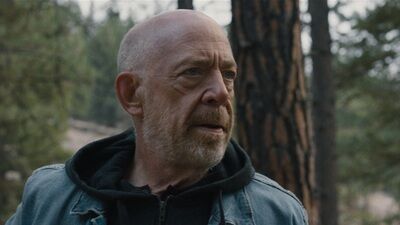The problem is that director Michelle Schumacher didn’t have the courage to make that movie. She’s constantly losing the tonal grip on this story, directing scenes with a flat lack of energy that leaves Simmons lost in a movie that has no idea what to do with him. The film really gets started when Wade encounters Eddie (Allen Leech) and his stepdaughter Miranda (Isabelle Anaya), killing the former and sending the young woman into the woods to survive. While Miranda’s very pregnant mother Jenny (Fernanda Urrejola) panics at home, and the inept local cops bumble their way through the investigation of what appear to be the first murders in their area—the best bit in the film involves an incompetent deputy reading a manual about how to handle a crime scene—Wade hunts Miranda through the woods. It’s another variation on “The Most Dangerous Game.”
And yet it’s not really. Schumacher and co-writer Carolyn Carpenter don’t really even trust their “predator vs. prey” concept, constantly bursting any rising tension by cutting back to a worried Jenny or the officers trying to figure out who is terrorizing their small town. And when flashbacks vaguely try to give Wade a loose motive for what he’s doing, the whole thing falls apart even further. This kind of movie only works with a ruthless, motiveless killer who pushes a victim into discovering their inner strength. But that kind of direct ‘one on one’ thriller requires trust in both performers and collaborators like editors and cinematographers who can make the setting into a threatening backdrop. There is absolutely zero tension in “You Can’t Run Forever.” It all feels like a lark, a project that would completely dissolve if not for the Oscar winner at its center.
About that Oscar winner—there is some perverted glee in watching a performer who is so far above everything else around him. The ruthlessness in his eyes, a twisted smile when he knows he’s in charge, a true sense of danger—that’s all there in Simmons’ choices. And yet none of his scene partners rise to meet what he’s trying to do, creating a weird professional/amateur dynamic that’s like watching mediocre athletes try to keep up with an all-star. Schumacher turns to cheap emotional tricks to try to amp up everything around her star, including using exploitative plot devices like suicide and the dangers of imminent childbirth, but none of it rises to Simmons’ level. He’s just running so fast that the film can’t keep up with him.

